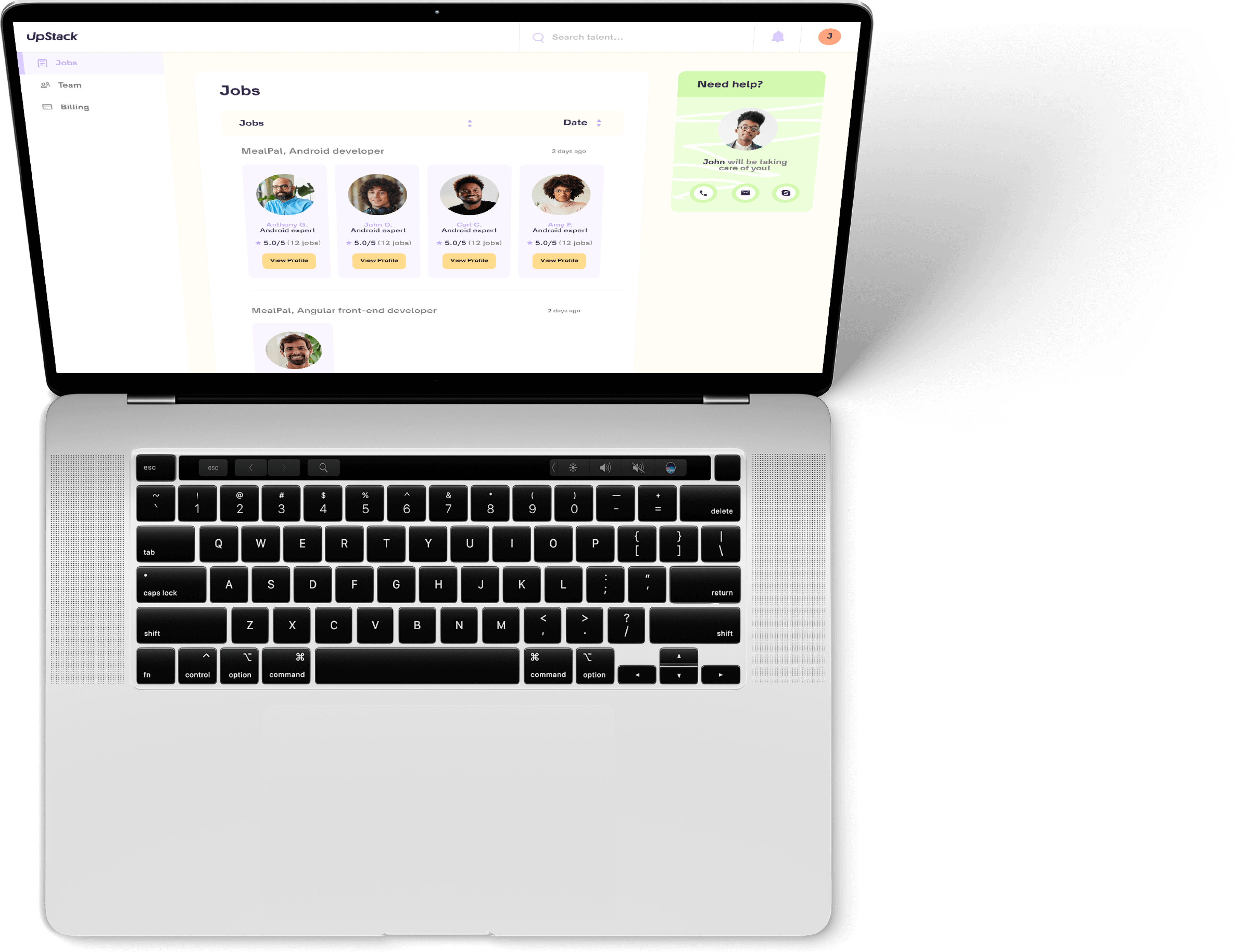


Hire R Developers Remotely {Devs Ready!}
Stella B.
Available
R Developer
-
Experienced R engineer with seamless project implementation
-
Loves guacamole & hates spoilers

-
Marcus T.
Available
R Engineer
-
Stacked portfolio of beautiful, functional websites
-
Known for his epic charcuterie & cheese boards

-
David M.
Available
Mobile Developer
-
Mobile engineering guru with a knack for translating stakeholder needs
-
Would rather be diving Palau’s Blue Corner

-
Top R Developers with Upstack
Hire R Developers with Upstack
If you’re looking to hire an R developer to help you build applications and analyze data, you’re in the right place. With the right candidate, R developers can be incredibly valuable – they can develop a wide range of data and applications, and help you to make the most of your resources. However, before you take the plunge and hire an R developer, there are a few things you need to know. In this section, we’ll explore the essential skills and qualifications you should look for in an R programmer, as well as the best practices you need to follow when hiring. With the right knowledge, you can make sure that your next hire is the right one for the job.
What is an R developer?
R is a programming language that is used for data analysis, statistical modeling, and data visualization. It is most commonly used in the fields of data science, machine learning, and artificial intelligence. R developers are the experts who build and create applications using the R programming language. In the data science space, R has been widely popular because of its versatility. It’s suitable for a wide range of tasks, like data modeling and cleaning, visualization, data transformation, statistical modeling, predictive modeling, and data science projects. With these advantages, R has become the go-to programming language for data science, statistical analysis, and data visualization. Companies across industries, like healthcare, finance, marketing, and more, use R to extract insights from data. This is why hiring an R developer is such a popular practice.
What skills and qualifications should you look for in an R developer?
In general, great R developers have three essential skills. They have proficiency in R, a keen understanding of data, and excellent communication and problem-solving skills.
Proficiency in R
The role of an R programmer is very much in line with that of an analyst in that much of their time will be spent analyzing data to glean insights. As such, the ability to use R fluently is absolutely essential. R is a highly technical language that is not entirely intuitive to learn. As such, hiring an R programmer who has been coding in R for years is critical. You need someone who understands the language fully and can use it productively.
Understanding data
While proficiency in R is a must-have for an R developer, it is not enough to simply know the language. As you are likely aware, data is the key to making smart business decisions. The insights gleaned from data can be the difference between a thriving business and one that struggles to stay afloat. To ensure that your R developers are using their skills wisely, they need to have a deep understanding of data. The best R developers are the ones who know how to collect data, clean it, and transform it into a usable format. This is because data is only as good as the way in which it is presented. If data is not in a usable format, it is difficult to analyze. While proficiency in R is necessary, it is not enough to simply know the language. You need an R developer with a deep understanding of data as well.
Excellent communication and problem-solving skills
Data analysis and problem resolution go hand in hand. An R programmer who can quickly resolve data issues and problem solve when a problem arises is a huge asset. Good communication skills are also critical for a team environment. For example, if two of your R developers are working on the same project, it is essential that they are able to talk to each other effectively and efficiently. This communication needs to extend further than the immediate team, too. R programmers should be able to communicate with the stakeholders, end users, and other key teams in the organization. Proficiency in communication is a skill that can’t easily be assessed during the hiring process. However, hiring an R developer who has excellent communication skills is critical to the success of your team.
How to assess an R developer’s skills
When assessing an R developer’s skills, it is best to do so by exploring their past work. R developers should have a portfolio of past projects that you can review. Doing so will give you a good idea of their skill level. A portfolio is a great way for an R developer to showcase their skills and let you know how they work and how they think. It allows you to see what types of projects they have worked on and what the outcomes were. Whether or not a portfolio is required varies from employer to employer. However, if it is not a standard part of the hiring process where you are, it is definitely worth asking your prospective R developers if they have one.
What are the best practices to follow when hiring an R programmer?
When you’re hiring an R developer, you want to make sure that you find the right person for the job. To do so, you should follow these best practices:
Hire for potential rather than experience
When you’re hiring an R developer, you want the best person for the job. Experience can be gained, but potential is innate. Therefore, when hiring, it is best to hire for potential. Hiring for potential is more of a risk, but it can also be a huge payoff and can help you to get ahead of your competition.
Look beyond the resume and the portfolio
When hiring an R programmer, don’t just look at their resume and portfolio. You want to make sure that you are hiring the best person for the job. This means that you need to make sure that you are checking for certain things during the hiring process and during the interview. You can do this by checking references, asking lots of questions, and verifying that the R developer is who they say they are.
Make sure that there is a good fit between the R developer and your organization
It is important that you make sure that the R developer and your organization fit well together. This means that you should look for someone who is a good fit for your team and the type of projects you are working on.
How to interview an R developer
The interview process is an essential part of the hiring process. While it is important to look at a candidate’s resume and portfolio, an interview gives you the chance to get to know the candidate on a personal level. Hiring an R developer is a significant investment for your company, and you want to make sure that you are hiring the right person for the job.
How to evaluate an R developer’s portfolio
Before hiring an R developer, it is important to first evaluate their portfolio. This will give you a sense of their skill level and let you know what they have done in the past. The portfolio can give you a good idea of what type of projects an R programmer has worked on in the past. It can also help you to get an idea of their skill level. While looking at the portfolio, make sure that you are assessing it in a fair way. Don’t be swayed by someone’s name or the company they worked for. Instead, make sure that you are assessing the portfolio as a whole and that you are not being biased.
How to negotiate salary with an R developer
Negotiating salary is a tricky process. However, it is also a very important one. You need to make sure that you are paying your R developer the right amount for their skill level. It is important to go into this process prepared. Before you start negotiating with the R developer, you need to know what your budget is and what the market rate for their skill level is.
How to onboard and manage an R developer
Hiring an R programmer is a significant investment. You will want to make sure that you are onboarding them correctly and managing their time so that they are able to make the most of their time and be truly effective. To do so, follow these best practices:
They trust Our R Developers
Why hire a R developer with Upstack
![R Developer and Programmer]()
Top R talent pre-vetted for a perfect fit.
Our 8-point assessment evaluation ensures that every senior R developer you interview exceeds expectations across technical, cultural, and language criteria.
![R Programmers Computer Icon]()
Hire reliable, passionate R developers.
From late-night sprints to jumping on a last-minute face-to-face, we ensure that your recruits are down to get the job done right.
![R Programmers High Five Icon]()
Risk-free 14-day trial.
Confidently onboard candidates with our no-questions-asked trial period. We’ll walk you through the contract-to-hire process if and when you’re ready to make it permanent with your new R engineer.
![R Computer Programmer Icon]()
Our Client Success Experts provide white-glove service.
Stay laser-focused on your business goals while our team of experts curates potential candidates and manages seamless programmer onboarding.
![R Developer Writing Notes Icon]()
Build your optimal team confidently, quickly.
UpStack handles everything including background and reference checks, legal issues, and more. Our platform streamlines billing, timesheets, and payment all in one easy-to-access place.
Schedule a call with a Client Success Expert to get starting hiring a R developer.
Start hiring Start hiring Start hiring
Hire from the Best.
Working with our Client Success Experts, we’ll help you build the remote team of your dreams with top R talent from around the world.
Pre-vetted, reliable R developers are standing by.





Hiring R Developers | FAQs
How much does it cost to hire a R developer?
UpStack has a simple billing model where each R developer has a standard hourly rate averaging between $65-$75 per hour. Rates are based on skills, knowledge, and experience, and our developers are available mainly for full-time engagement (40 hours per week) and the occasional part-time opportunity (20 hours per week).
What is the process to find a R developer?
You’ll connect with an UpStack Client Success Manager to determine your immediate needs. Our team uses a combination of AI and personal assessment to short-list candidates that match your job requirements. From there, you interview, select, and onboard the perfect developer, all within days of your initial call.
How does UpStack find its R developers?
UpStack’s talent recruitment team connects with software developers around the globe every day. Each R programmer is vetted for technical, communication, and other soft skills necessary for a developer to successfully work with your team. Once vetted, the candidates are accepted into the UpStack developer community.
How is UpStack different from an agency or recruiter?
UpStack's community of available, pre-vetted engineering talent means minimizing roadblocks to scaling your team effectively, efficiently, and immediately. Our Client Success Experts work with you and your UpStack developer to ensure a smooth and seamless engagement.
Can I hire UpStack R developers directly?
Yes, you can hire UpStack R developers at any time, and with the same assurance of smoothly on boarding talent risk-free. First, we’d create a job opening on our portal. Then, we’d vet, interview, and match developers that meet your needs. If you’re satisfied at the end of the 14-day trial period, at any time you can directly hire them.
Common R FAQs
What is R?
R is a programming language and software environment for statistical computing and graphics. It was developed in the early 1990s by Ross Ihaka and Robert Gentleman at the University of Auckland in New Zealand. R is widely used by statisticians, data scientists, and researchers in a variety of fields, including finance, biology, and psychology. It is particularly popular for data analysis, visualization, and machine learning. R is an open-source software, which means that it is freely available for anyone to use and modify. It has a large and active community of users and developers who contribute to the development of the software and share packages and tools for data analysis and visualization. R is known for its powerful and flexible statistical and graphical capabilities, as well as its ability to easily integrate with other software and tools. It is often used in conjunction with other tools, such as Excel, SQL, and Python, to create more complex data analyses and visualizations. If you are new to R, there are many resources available to help you get started, including online tutorials, books, and courses.
What tool do most R developers use?
Most R developers use a programming environment or integrated development environment (IDE) to write, edit, and run their R code. Some of the most popular IDEs for R include:
- RStudio: This is a free, open-source IDE that is widely used by R developers. It includes features such as code highlighting, debugging tools, and a built-in console for running code.
- Jupyter Notebook: This is a web-based IDE that allows you to create and share documents that contain live code, equations, and visualizations. Jupyter Notebook is popular for data science and machine learning tasks, and it can be used with R as well as other programming languages.
- Visual Studio Code: This is a general-purpose IDE that can be used for a variety of programming languages, including R. It includes features such as code completion, debugging tools, and integration with version control systems.
- Eclipse: This is a general-purpose IDE that can be used for a variety of programming languages, including R. It includes features such as code highlighting, debugging tools, and integration with version control systems.
In addition to these IDEs, many R developers also use other tools and packages to aid in their work, such as version control systems (e.g., Git), data visualization libraries (e.g., ggplot2), and machine learning libraries (e.g., caret).
Is R or Python better?
It's difficult to say definitively which programming language is "better" between R and Python, as both have their own strengths and are suitable for different types of tasks. Here are a few points to consider:
- R is a programming language and software environment specifically designed for statistical computing and data visualization. It is widely used by statisticians and data scientists, and it has a large number of packages and libraries available for statistical analysis, machine learning, and data visualization.
- Python is a general-purpose programming language that is widely used in a variety of fields, including data science, web development, and scientific computing. It has a large and active community of users, and it has a wide range of packages and libraries available for data analysis, machine learning, and visualization.
- R is generally considered to be more focused on statistical analysis and data visualization, while Python is more general-purpose and can be used for a wider range of tasks. However, both languages have strong capabilities in these areas, and many data scientists and analysts use both languages in their work.
Ultimately, the choice between R and Python will depend on your specific needs and goals. If you are primarily interested in statistical analysis and data visualization, R might be a good choice. If you need a more general-purpose language that can be used for a wider range of tasks, Python might be a better option. It's also worth noting that it's possible to use both languages together, as they can be integrated and used in combination with each other.
Is R and C++ the same?
No, R and C++ are not the same. R is a programming language and software environment specifically designed for statistical computing and data visualization. It is widely used by statisticians and data scientists, and it has a large number of packages and libraries available for statistical analysis, machine learning, and data visualization. C++ is a general-purpose programming language that was developed in 1979 by Bjarne Stroustrup. It is a high-performance language that is commonly used in applications where performance is critical, such as operating systems, web browsers, and games. C++ is also widely used in scientific computing, as it allows for low-level control of hardware and has strong support for numerical computation. While R and C++ are both programming languages, they are used for different purposes and have different strengths. R is more focused on statistical analysis and data visualization, while C++ is a lower-level language that is more suited to performance-critical tasks. It is possible to use C++ libraries in R using the Rcpp package, but R and C++ are not the same language.















